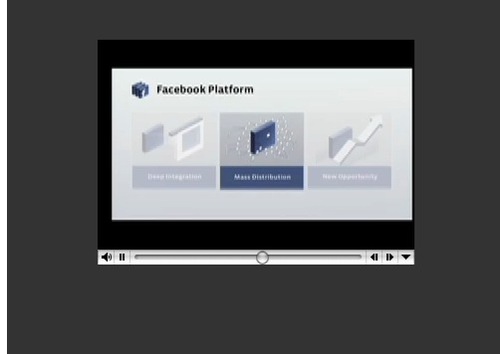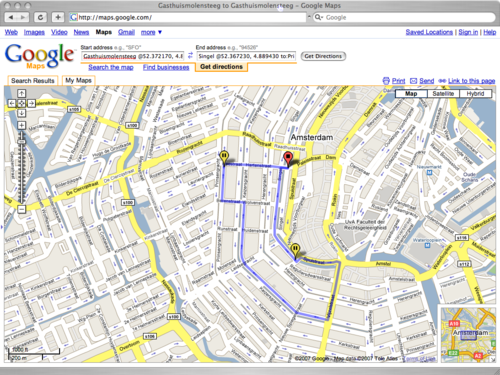This was October 2007 | « September 2007 | Main | November 2007 »
Some news from Zurich
Posted on Monday, October 29, 2007
A presentation I was pointed to: Web2.0 thoughts from Rolf Skyberg, disruptive innovator at eBay.
ESA is taking a leap with this Space & Art exhibition highlighting some of the best artists out there working with space related concepts & technologies:
ARTIST AS SPACE EXPLOREROn the eve of 'Space Exploration - A Global Societal Project', 7-9 November 2007 in Berlin, a special presentation shows why artists, as important opinion formers in society, should be part of the whole picture of exploration.
The exhibition is curated by The Arts Catalyst and presented in collaboration with the European Space Agency and Transmediale, the Berlin-based festival for art and digital culture.
The potential cultural dimension of the European Space Agency's exploration activities is shown here in a group of projects specially devised to accompany Europe's activities in space, collaborating with the European astronauts on the International Space Station, highlighting Europe's ground-based space facilities such as microgravity facilities, mission control and launch sites, and looking towards the future of moon and Mars missions. The projects are designed to have a high profile in the European media and also to show how the world of the arts is engaging seriously with space issues.
The exhibition is one of the more visible outcomes of the ISS Cultural Utilisation study and is being held as part of a large scale International Space Exploration Conference organised by ESA and DLR and taking place in Berlin 8 & 9 November. Looking forward to see the exhibition and meet some of the artists present. Its gonna be interesting to see what Europe has to say about its future in space (update: I just found out that the first European O'Reilly Web2.0 Expo is taking place in Berlin during the same week):
SCOPE & OBJECTIVESIn 2001, space exploration was identified by ESA Member States as one of Europe’s key priorities for the future and the European space exploration programme, Aurora, initiated. In the context of this programme, Europe is planning ahead for the future and developing a long-term strategy for space exploration which provides perspective and orientation for future European investments in space exploration. The underlying principle of the European strategy is to implement space exploration as a global and societal project contributing to societal development. Following this principle the development of the strategy is performed in close consultation with all key stakeholder groups and to this effect ESA has undertaken various stakeholder consultation activities in the last years. The fundamental motivation for an early engagement of stakeholders in the strategy formulation phase is to create the foundation for a sustainable European space exploration programme which creates value for the society. At the time of the International Exploration Conference a first version of the European long-term strategy for space exploration will have been developed. The key objective of this conference is therefore to share with the broader stakeholder community the outcome of consultations and work performed throughout 2006 and 2007.
It will address in particular:
- The broader societal relevance of space exploration based on principles such as inspiration, knowledge, innovation, competitiveness and cultural development.
- Specific European interests and goals and the resulting European long-term scenario for space exploration.
- The international scenario and the importance of broad international coordination of European space exploration activities with existing and new international partners who can contribute to the robustness and cost-effectiveness of the programme.
- The focus of near-and medium term European and international exploration activities and the required means for exploration.
Objectives
- Reaching out to new stakeholder groups, not yet known to the space community, who may not know that they are stakeholders or even beneficiaries of space exploration and vice versa.
- Build a broad support base by creating awareness amongst current and new stakeholders groups.
- Create sustained interest and active support for space exploration as a societal project.
- Target each group with a specific tailored message to enhance understanding on space exploration and why it is important for society at large.
- Encourage continuity in relationships between institutions such as ESA and different stakeholder groups.
DinnerTV: Adapt or Die
Posted on Sunday, October 28, 2007
Vint Cerf about Digital Economics at the Google Analyst Day 2007:
Darwin was right, you only have two choices: adapt or die
@23:16 he gives a quick update on the Interplanetary Internet.
DinnerTV: Web2.0 Summit videos
Posted on Friday, October 26, 2007
And yet another good one, this time about the Semantic Edge, the platform of platforms (recursion recursion...we didn't did invent language, and now we're only mapping it. its a nice user interface for sure). More after the weekend, first its time for a couple of days on the Edge of the Alps .
DinnerTV: Web2.0 Summit videos
Posted on Friday, October 26, 2007
Another good one, Google, Microsoft and TeleAtlas talking about one of the web's edges, i.e. mapping. Btw, if you experience some problems with scrolling through the videos (which is not allowed!?), you can also subscribe to the videos via iTunes and scroll through them that way.
DinnerTV: Web2.0 Summit videos
Posted on Thursday, October 25, 2007
They're all interesting and they keep adding new ones. The discussion between Tim O'Reilly and Craig Venter is especially worth the time invested. To add to that, what about this term: "user generated biotechnology" ;)
Its A Wiki Space Out There
Posted on Wednesday, October 24, 2007
"The ability for more people to see [mapping] data and comment on and improve it over time is definitely where we are going," said Brian McClendon, engineering director of Google Earth.Once we've mapped the Social Graph, what's next? 3D space was always there. We didn't invent it, we are only mapping it. More over at InformationWeek (via AllPointsBlog)
Web2.0 summit
Posted on Sunday, October 21, 2007
For a quick update on what's happening with Web2.0, have a look at the bloggin' over at O'Reilly Radar on the Web2.0 Summit that took place last week. Here are a couple of interesting posts in my opinion:
- Web2Summit: Backstage with Rob Currie of Dash
- Web2Summit: Radar Networks Unwinds twine.comWeb2Summit: Backstage with Meg Whitman
- Web2Summit: Backstage with Mark Zuckerberg
- More on Techmeme and Financial Markets
Here are the videos. And this is another good post @ O'Reilly: CFP Where2.0 2008
DinnerTV: 30min. of the Google Guys @ Zeitgeist 2007
Posted on Sunday, October 21, 2007
Zeitgeist 2007 (below is the Youtube video). @ 9:54 Larry Page talks briefly about Google's involvement in the X-Prize, @ 17:32 Esther Dyson hints at inner space (i.e. healthcare) being a more interesting market than outer space:
Outer space is really cool but I am not sure how much Google can do with it.(via SearchEngineLand)
Vint Cerf on the Status of the Interplanetary Internet
Posted on Sunday, October 21, 2007
Found at SpaceDaily:
Internet preparing to go into outer space (nice title!)
After expanding across Earth, the Internet is now set to spread into outer space to reach parts no network has gone before, one of its co-creators predicted Wednesday.
Vinton Cerf said the proposed "interplanetary" Internet would allow people an ability "to access information and to control experiments taking place far away" from Earth.Expanding into the solar system would bring new rules and regulations too, he told an annual Seoul forum, saying he and other experts were working on a set of standards designed to guide space-era Internet communications.
"Finally, the Internet can take us where no network has gone before," said Cerf, who is Google's vice president and chief internet evangelist,
He said he and a team of engineers at the California-based Jet Propulsion Laboratory would complete a key part of the project -- establishing standards for space communications like those for Internet -- in three years.
Cerf told a separate news conference that new standards were needed because of the huge distances and time delays involved in communication across space.
He went on: "This effort is now bearing fruit and is on track to be space qualified and standardized in the 2010 time frame.
"Eventually we will accumulate an interplanetary backbone to assist robotic and manned missions with robust communication."
Geofencing
Posted on Tuesday, October 16, 2007
Doing a quick internet scan on GPS enabled devices, I run into an interesting term: Geofencing (e.g. here). Makes me think of draggin' a route on Google Maps.
Evo Devo IntelliDeso...Mutating Pictures
Posted on Friday, October 12, 2007


Dawkins' book 'The blind watchmaker' has an extensive discussion of how evolution walks through the solution space of an evolving artificial species. Above images from Mutating Pictures are a nice example of this when you take it to the web for people to do the selection (via Google Blogoscoped).
Virtual just another layer on top of physical
Posted on Friday, October 12, 2007
Tim has an interesting post up at O'Reilly Radar where he talks about the announcement of IBM and Linden Labs (creator of Second Life) that they're working together on interoperability of virtual worlds:
I look also for the 3D web to interoperate with location-based services. We shouldn't think of this interoperability as being just for virtual worlds. Ultimately, virtual is just another layer on top of physical. GIS folks don't think of maps per se, they think of map layers -- hundreds or thousands of levels of data overlaid on the world. Many of these layers are abstract and virtual. Aren't street addresses actually virtual? Might not other classes of data be anchored to the real world in some way? A company has a physical address, but they also have an address on the telephone network, an address on the web, and many others. Just as a skyscraper reaches into the sky from a single street address, housing thousands of souls at work or at sleep, might there not be virtual towers anchored to physical locations, embracing and extending our world?
There's quite a future ahead of us here. It's silly to try to recreate the wheel (or to own the wagon) when by working together we can build something that is so much bigger. Open standards are a winning strategy.
DinnerTV: Facebook meme
Posted on Monday, October 8, 2007

A few weeks of relative unplugged quality time and whoop, you're missing the 'next big thing' on the Internet. It took a while, but I finally spent some time reading up on the Facebook meme. Mmm, interesting, a pagerank Social Graph view on people instead of websites...For a good intro, read this, make an account here, and have a look at this video with Mark Zuckerberg talking about the Facebook platform for developers (not sure if I like his version of the Steve Jobs style though...).
The future is process, not a destination
Bruce Sterling
Everything is ultimately becoming information technology
Ray Kurzweil
Data is the Intel inside
Tim O'Reilly
There is only one machine and the web is its OS
Kevin Kelly
The medium is the message
Marshall McLuhan
